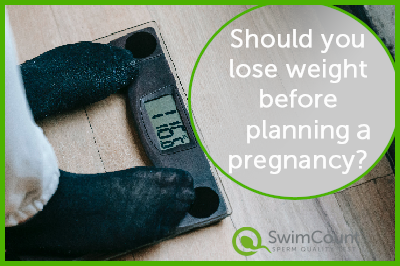
Should you lose weight before planning a pregnancy and Why?
Share
The past year has been challenging for the whole society and in many ways. One of the challenges was: “Should I use this corona time productively, because I will never have this much free time again or should I relax and sleep in because I will never have this much free time again?”. But, overall people have been spending more time at home during 2020 and 2021, and our lifestyles in general are more sedentary, with not so regular exercising or less opportunities to look after our physical health. Because of this struggle to maintain an active lifestyle, many of us have gained weight. But if you are planning to get pregnant, how important it is to lose some kilos and achieve a healthy weight before conceiving?
Here are some reasons WHY you should consider losing weight before getting pregnant:
1. It is more difficult to get pregnant
While in most cases being overweight does not impact your chances of getting pregnant, though being obese does. Obesity is a medical term that is used when a person’s Body Mass Index (BMI) is greater than 30. You can calculate your BMI here.
Weight has an effect on your hormones, and for women who are overweight it is more common to experience irregular menstruation, this can as well prevent your ovaries from releasing an egg for fertilization (aka ovulation)
Irregular menstruation can also prevent you from realizing that you are pregnant right away. It is important to know that you are pregnant sooner rather than later, to avoid doing something harmful to the fetus, such as smoking or abuse of alcohol or drugs.
It is important to know that even a slight decrease of body fat (by 5-10%) can have a significant impact on reproductive health in overweight and obese women.
2. Pregnancy complications
Being obese during pregnancy increases the risk of various pregnancy complications, such as:
Gestational diabetes - a condition that increases the amount of glucose in your body because you don’t produce enough insulin. Gestational diabetes cannot only cause your baby to have a higher birth weight (making labor more challenging and riskier) but also increase the likelihood of premature labor. You are also more likely to need a cesarean delivery compared to women who don’t have gestational diabetes.
Preeclampsia – “Preeclampsia is a predictor of cardiovascular disease and other metabolic disorders in later life. Identifying modifiable risk factors for preeclampsia is an important priority for preventing disease onset during pregnancy and potentially reducing longer-term health risks.”[1]
- Placental abruption, where the placenta separates from the uterus
- Poor fetal growth, caused by a lack of nutrients and oxygen
- Preterm birth
- A low-birth-weight baby
- Stillbirth
- Damage to your kidneys, liver, brain, and other organ and blood systems
- Eclampsia, which happens when preeclampsia is severe enough to affect brain function, causing seizures or coma
Miscarriage and stillbirth – “Obesity is a problem at all stages of reproduction, beginning with increased rates of infertility and subsequent higher spontaneous early and recurrent early miscarriages compared with women in the healthy weight range. In pregnancies achieved with the assistance of reproductive technologies, obese women have greater rates of pregnancy loss in the first six weeks than normal BMI controls. Stillbirth is a tragic occurrence and the association of stillbirth with obesity is a further reason that we need to urgently address the epidemic of overweight and obesity in our society.”[2] – Dr. Simon Craig
3. It can affect the baby
A recent study shows that male babies who are born to overweight and obese women are 40% more likely to grow up infertile. In Demark more than 9000 adult sons and daughters were examined of women who were enrolled in a study while being pregnant between 1984‐87. “Sons born to overweight mothers had higher odds of infertility compared with sons of normal weight mothers. No association between maternal overweight and infertility was observed in daughters. Prevention of overweight during pregnancy may be an important tool to preserve fertility in future generations.”[3]
A previous study from the US found that boys — but not girls — born to obese mothers had worse motor skills at the age of three and lower IQ scores at seven.
Key take-aways
Obese women are advised to reduce weight before becoming pregnant, in the interests of their own and their baby's health.
However, pregnant women who are obese are not recommended to attempt losing weight as this can be dangerous, and, furthermore, there is no evidence that losing weight while pregnant reduces the chance of complications.
No matter of your weight, it is important to visit a healthcare professional before trying to get pregnant. That way you can be sure that you are healthy. You can also discuss any risks or problems you may face before or during pregnancy and be in contact with a specialist if you have any questions during the process.
[1] https://www.ahajournals.org/doi/full/10.1161/HYPERTENSIONAHA.118.10999 - Pregnancy Weight Gain Before Diagnosis and Risk of Preeclampsia by Jennifer A. Hutcheon, Olof Stephansson, Sven Cnattingius, Lisa M. Bodnar, Anna-Karin Wikström and Kari Johansson
[2] https://www.ogmagazine.org.au/15/4-15/obesity-and-stillbirth/ - Obesity and stillbirth by Dr Simon Craig
[3] https://obgyn.onlinelibrary.wiley.com/doi/10.1111/aogs.14045 - Maternal pre‐pregnancy overweight and infertility in sons and daughters: A cohort study by Linn H. Arendt, Birgit B. Høyer, Anne F. Kreilgaard, Bodil H. Bech, Gunnar Toft, Karin S. Hougaard, Jens P. Bonde, Jørn Olsen, Cecilia H. Ramlau‐Hansen
